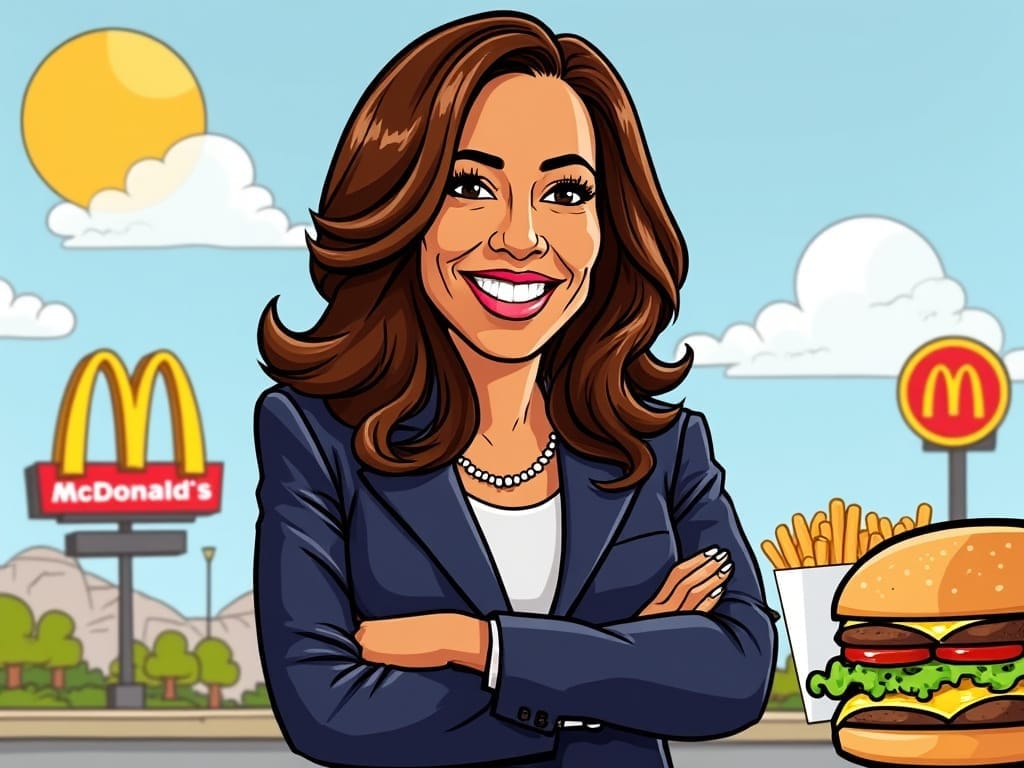McDebate Sizzles Presidential Race With Fast Food Past
Vice President Harris's claim of a McDonald's summer job sparks controversy, highlighting the scrutiny of candidates' personal histories in modern political campaigns.

Vice President Kamala Harris's casual mention of a summer job flipping burgers at McDonald's during her college years has unexpectedly become a flashpoint in the 2024 presidential campaign, with Republican challenger Donald Trump leading the charge in questioning its veracity.
Harris, in an effort to connect with working-class voters, has frequently recounted her alleged stint at the fast-food chain in campaign speeches and media appearances. She has specifically stated that she worked at a McDonald's in Alameda, California, during the summer of 1983, while a student at Howard University. This anecdote, often accompanied by her trademark infectious laugh, has become a staple of her narrative, highlighting her understanding of the struggles faced by many Americans, particularly those working in low-wage jobs. However, this seemingly innocuous detail has ignited a firestorm of controversy, with Trump and his allies seizing upon it as a supposed example of Harris's dishonesty.
The controversy began to simmer when right-wing outlets like The Free Beacon questioned the absence of any prior mention of the job in Harris's extensive public record. They pointed out that neither her autobiographies, The Truths We Hold and Superpower: One Woman's Journey to Lead, nor her previous campaign materials featured this detail, suggesting a recent and possibly strategic addition to her narrative. The story's integration into her campaign messaging was further highlighted when Bill Clinton joked during the Democratic National Convention about Harris potentially breaking his record for most visits to McDonald's. Trump has amplified these claims, taking to social media to declare, "Comrade Kamala Harris lied about working at McDonald's." He has repeatedly asserted, without evidence, that Harris never held such a position, even going so far as to claim that an "exhaustive study that took about 20 minutes" revealed the truth.
Trump has also stated that people believe Harris is "nuts" for claiming she worked at McDonald's. His claims have been echoed by other right-wing media outlets and figures, further fueling the controversy. While Harris's campaign has not yet directly addressed the specific claims with concrete evidence, they have defended her right to discuss her past experiences and connect with voters on a relatable level. The absence of definitive proof, such as pay stubs, employment records, or confirmation from former colleagues or managers, has left the claim in a state of "research in progress" according to fact-checking website Snopes. The controversy surrounding this seemingly trivial detail highlights a broader trend in the current political landscape.
In an increasingly polarized environment, even seemingly innocuous details can be weaponized for political gain. Critics argue that Trump's relentless focus on this issue is a distraction tactic, designed to deflect attention from more pressing matters and sow doubt about Harris's credibility. However, the incident also serves as a reminder of the importance of transparency and accountability in politics. While Harris's story might be entirely truthful, the lack of readily available evidence has allowed her opponents to exploit the situation for political gain. The McDonald's McDebate, as some have dubbed it, is unlikely to disappear soon.
As the campaign progresses, voters and media outlets will continue to scrutinize this and numerous other aspects of both candidates' records for accuracy. The incident serves as a cautionary tale for both candidates, reminding them of the scrutiny that comes with the highest office and the potential for even seemingly minor details to become major talking points. Ultimately, the question of whether or not Harris truly worked at McDonald's might be less important than the larger implications it raises about the nature of political discourse and the ease with which misinformation can spread in the digital age.

